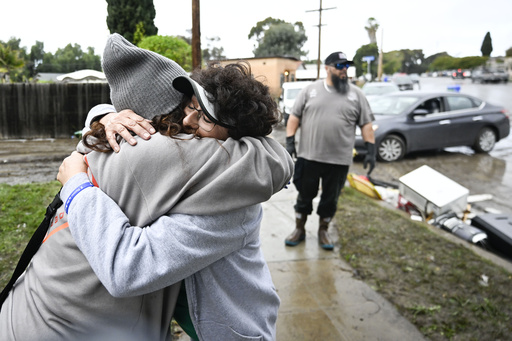
Homeowner Deanna Samayoa, left, hugs her neighbor Anita Torones in front of her home, which was damaged by flooding on Tuesday, Jan. 23, 2024, in San Diego. Deanna Samayoa’s home was damaged when flood waters rushed through it on Monday, Jan. 23, 2024. California Gov. Gavin Newsom declared a state of emergency for San Diego County and Ventura County, which was also hit by heavy rains that caused flooding there in late December, stating that “I find that local authority is inadequate to cope with the magnitude of the damage caused by these winter storms.” (AP Photo/Denis Poroy)
SAN DIEGO — Stunned residents, some breaking down in tears, pulled soggy and muddy furniture from their homes in San Diego on Tuesday, a day after flash floods from a torrential storm produced the city’s fourth-wettest day in nearly 175 years, an inundation in stark contrast to its image as a balmy seaside paradise.
An astonishing 2.73 inches (6.9 centimeters) of rain fell Monday in the Pacific coast city, which usually gets about 2 inches (5 centimeters) on average for the entire month of January. It was also the city’s rainiest day ever in January, according to records dating to 1850.
“Nothing is salvageable,” said Deanna Samayoa, who spent Tuesday morning hugging and crying with neighbors outside their homes, surrounded by towering piles of debris and trash.
READ: Flash floods inundate homes, overturn cars in San Diego, California
Vehicles were swept away as people fled amid the torrents coursing through their Shelltown neighborhood near a drainage canal. Several other pockets in the city were also hit by the deluge. Samayoa’s son waded through water up to his neck as he carried a toddler to safety, she said.
“It was horrible,” she said. “Help did not arrive soon enough.”
California Gov. Gavin Newsom declared a state of emergency for San Diego County and Ventura County, hit by heavy rains and high surf that caused flooding.
“I find that local authority is inadequate to cope with the magnitude of the damage caused by these winter storms,” Newsom said.
The rain fell quickly in San Diego on Monday morning, submerging streets and freeways, halting traffic, buses and trolleys, and catching many people off guard. Rainfall forecasts had predicted 1 inch (2.5 cm) on the coast and double that in the mountains.
“The water rose in an hour up to our necks,” said Anna Ramirez, whose mother, Maria Hernandez, also suffered damage to her home nearby. “I had to pull a lady out of the water and she didn’t know how to swim. She was crying for her life. It was very scary, very traumatizing.”
Hundreds were rescued from homes, according to a statement from the City of San Diego. Firefighters and lifeguards rescued about two dozen people from the rushing San Diego and Tijuana rivers, the fire department said. Two homeless shelters were also evacuated.
It was just sprinkling when Eddie Ochoa and his sister went out for breakfast, but when they returned to their family-owned auto body shop, the entire block was flooded and his sister’s parked car had been washed away.
“It’s never been that bad, ever,” Ochoa said. “It’s crazy.”
The Red Cross set up an emergency shelter for those who were displaced.
A rough calculation shows that more than 150 billion gallons (568 billion liters) of water fell on San Diego County over three days, much of it in a three-to-six-hour period, Ryan Maue, former chief scientist for the National Oceanic and Atmospheric Administration, said in an email to The Associated Press. He said the city’s drainage canals and infrastructure cannot handle such a deluge.
“The rainfall rates and duration … overwhelmed the capability of the urban and natural interface to reroute the water back to the ocean, especially with so much also falling inland at high elevations,” Maue said.
Hundreds of city workers were sent out in advance to clear storm drains and monitor pump stations, but many of the pump stations reached capacity during the storm and were overwhelmed, the city statement said.
The city described the stormwater system as aging with limited capacity.
“Monday’s record rainfall revealed the fragile state of the City’s stormwater infrastructure and the need for significant investments going forward to prevent the current situation from becoming the new normal for San Diego,” the statement said.
Elsewhere, nearly a foot of snow (30 centimeters) fell in parts of the Sierra overnight. The next storm system aimed at California is expected to move in late Wednesday into Thursday.
Wet and snowy weather hit many of the U.S. this week, including Alaska, where the capital city, Juneau, was under a winter storm warning until Wednesday. City offices and facilities were closed Tuesday, and officials urged residents to avoid nonessential travel. Juneau has received more than 55 inches (140 centimeters) of snow so far this month, more than double the average amount for January.